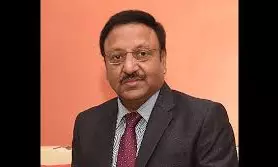ECI announces election schedule for Delhi Assembly
Since the Delhi elections coincide with the Union Budget on February 1, chief election commission Rajeev Kumar said the Union Cabinet Secretary will be told that no Delhi-specific provision or announcement can be made in it that can disturb the level-playing field;

New Delhi: The Election Commission of India on Tuesday sounded the clapperboard for the 70-seat Delhi Assembly elections to be held on February 5, with counting on February 8. Bypolls to two Assembly constituencies, Milkipur in Uttar Pradesh and Erode in Tamil Nadu, will also be held on the same schedule.
The last date to file nominations is January 17 and the scrutiny of nominations will be done by January 18. The candidates will be able to withdraw their nominations till January 20.
Since the Delhi elections coincide with the Union Budget on February 1, chief election commission Rajeev Kumar said the Union Cabinet Secretary will be told that no Delhi-specific provision or announcement can be made in it that can disturb the level-playing field.
With the Model Code of Conduct kicking off immediately, the EC made it clear that candidates and party leaders will need to watch their words as there will be “zero tolerance” on derogatory words used against women and use of children during the campaigns. Clearly upset with BJP candidate Ramesh Bhiduri’s sexist comment against Congress leader Priyanka Gandhi Vadra and Delhi chief minister Atishi Singh recently, Mr Kumar warned that if candidates “cross the lines”, then the EC too will have to take strict action and this includes filing criminal cases against them.
While condemning Mr Bhiduri’s remarks, the CEC said the EC can act only when the MCC is in place. "On one hand we are trying to bring more and more women to the booth... If you speak in such a manner about mothers and sisters, it is shameful,” he said.
Mr Kumar said the Election Commission will conduct checks to ensure free and fair polls. "We will check everyone for ensuring money-free elections. During recent polls, there was a lot of noise when some helicopters were checked. People even come down to threatening polling officers but we control ourselves because it disturbs the level playing field," said the CEC. He was pointing to Udhhav Thackeray’s outburst against a poll official for checking his helicopter in Maharashtra.
“The star campaigners and those in political campaigns are duty-bound to ensure that etiquette is followed. We also request the political parties not to create undue pressure on the officials," the CEC added.
Meanwhile, the CEC, who will be supervising his last election before retiring, sought to set record straight with regard to allegations of EVM tampering, manipulation of voter lists, voter turnout discrepancies, and denial of giving CCTV footage of the voting day.
Mr Kumar said the courts have ruled on 42 occasions that EVMs are not hackable and allegations of tampering are totally baseless, and advised the public against falling for “jhooth ke gubbare”. He said in 30 states where elections were held in the last five years, in 15 different parties have come to power in different states.
”EVMs are commissioned only seven to eight days before polling day and candidates are kept informed through their agents at every step. Courts have ruled on 42 occasions that EVMs are not hackable... allegations of tampering with the machines are totally baseless," Mr Kumar said.
The CEC also underlined that it is impossible to change voter turnout data and a misconceived narrative is being spread about an increase in voting after 5 pm. Dismissing allegations of manipulation in electoral roll, as alleged by some AAP leaders, the CEC said saying no deletion can occur without thorough documentation, field verification, and giving the concerned individual an opportunity to be heard.
“In 2024, some apprehensions and doubts were raised. It was said that there were wrongful additions and deletions in electoral rolls. This started recently after general elections is currently going on in Delhi. It was also said that certain groups are targeted and names of voters are removed…The process for additions and deletions is transparent, rigorous, and immune to arbitrary changes. Every step of the electoral roll process is rooted in transparency and accountability. Deletion of names is not possible without adhering to strict protocols, and every party has the right to raise objections at various stages," said Mr Kumar.
Criticising the tendency to question the integrity of the electoral process only during elections, the CEC argued that allegations of mass deletions are misleading without evidence and undermine public trust in the system.
"Where every vote matters, raising doubts about deletion of thousands of names without evidence is misleading. The processes we follow leave no room for manipulation," he stated.
With regard to EC norms for not giving CCTV footage of poll booths or video recording of candidates activities, the CEC says this was to prevent profiling of voters, manipulating or threatening them and to prevent misuse of the video through Artificial Intelligence.
On a question on reforms needed in EC, the CEC suggested that the government explore the possibility of totalisation of votes and remote voting.

